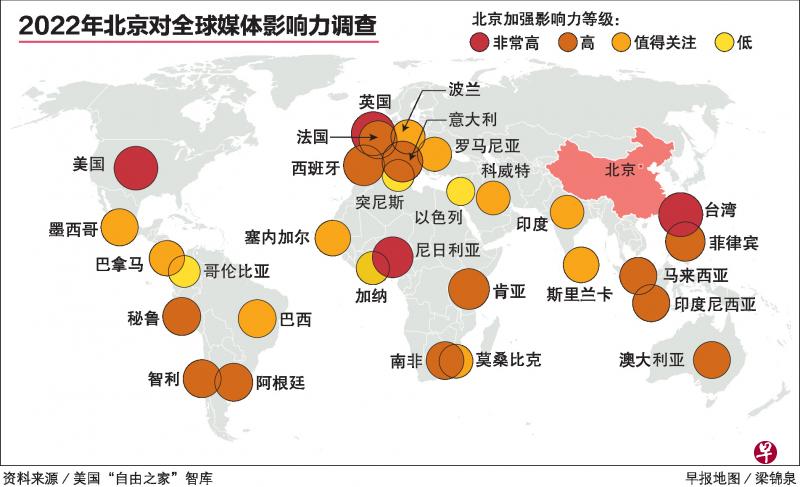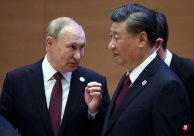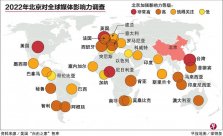
The 2022 China influence report on the global media published by the US think tank "Freedom House" found that China plus in multiple countries from January 2019 to December 2021, plus in many countries.Great influence, strive to improve the right to speak internationally.
With the exacerbation of China's rise and competition between China and the United States, China ’s embassies and consulates around the world have increased their efforts to interact with local media in recent years and strive to improve Beijing’ s international voice.In Southeast Asia, China's positive activities in foreign announcements have also attracted attention. Scholars have pointed out that different from taking "wolf diplomacy" to some Western countries. China is more prominently in the region to highlight and win -win cooperation in this region to create a favorable China that is conducive to China.Surroundings.
Freedom House's 2022 China ’s influence on the global media published on September 8th, published on September 8, found that China increased in many countries from January 2019 to December 2021.It has influence.
"Freedom House" is a non -profit institution funded by the US government. It invited researchers from 30 countries to participate in the investigation and assisted in answering questionnaires to evaluate China's influence level in various places.Among the 30 countries, 18 influences of China have increased in these three years; 16 of them believe that China's influence is "high" or "high", including Malaysia, the Philippines and Indonesia.
On the other hand, Wang Zheng, an affiliated to the Erv Yisa East South Asian Research Institute of Singapore, published a report on September 12 in the institute's electronic journal "ISEAS Perspective".During the period, the Chinese Embassy actively communicated, submitted and interviewed with Southeast Asian media.
The statistical results obtained by Wang Zheng based on the information of the website of the Chinese Embassy show that Chinese leaders and diplomats have published 154 articles in various Chinese media in Indonesia, Malaysia, Brunei, East Timor and the Philippines;The Chinese Embassy interacted 338 times.
Wang Zheng said in an interview with Lianhe Morning Post that interaction with local media through embassies is not a new phenomenon. "But to enhance the power of international public opinion by strengthening the connection with foreign media and think tanks, it has become China's foreign propagandaThe key goals. "
China is trying to compete in the international public opinion field that has always been led by Western countries.On May 31 last year, Chinese officials asked to improve international communication work during the collective study at the Political Bureau of the Central Committee of the Communist Party of China.
Li Mingjiang, an associate professor at the Nanyang University of Science and Technology, Singapore Nanyang University of Technology, analyzed the United Zaobao that in the context of the intensified contradictions between China and the United States, China faced the criticism, accusations and targets of Western political elites and media.Therefore, China believes that it is necessary to increase its efforts to explain the positions of domestic policies and international relations.
Li Mingjiang said: "After Chinese officials emphasize 'tell the story of Chinese", Chinese media institutions and foreign personnel have also strengthened their efforts to explain China's position on the media network and social platforms. "
In some Southeast Asian countries, local society can clearly feel the increase in activities of Chinese diplomats.For example, in Malaysia, the local Chinese discovered that in addition to the Chinese society, Chinese officials also vigorously expanded and operated the connections with the Malay communities.
Report: The official content of the official content of China in China through mainstream media in various places
On the other hand, the report of "Freedom House" criticized China to spread official content on a large scale through mainstream media in various places and harass and intimidate media institutions that are not good for news or views to China.The report states that China has conducted online bullying, opens fake accounts in social media and promotes false information.
In this regard, Mao Ning, a spokesman for the Chinese Ministry of Foreign Affairs, refuted at a regular press conference on September 8. The report of the "Freedom House" ignored the facts and was attentive.China shows the real image of China to countries in the world, "this is essentially different from the so -called 'expansion influence' and 'false propaganda'."
Dr. Rao Zhaobin, director of the China Institute of Malaya University, believes that China is indeed trying to create a favorable public opinion environment in Southeast Asia. However, some diplomatic actions in China are deliberately enlarged and hyped by Western countries from time to time."For example, China and Malaysia to promote friendly relations are often fried as a means of United Front in China."
Southeast Asia has become one of the forefronts of the geopolitical competition between China and the United States.As a region with a growth potential and a neutral attitude towards China's rise, Southeast Asia's support is more important to China.
Wang Zheng pointed out that China ’s narrative in Southeast Asia overall is positive, emphasizing information such as mutual benefit and win -win cooperation, which is obviously different from that China’ s “wolf diplomacy” in Western countries.He said: "This reflects China's emphasis on the geopolitical level of Southeast Asia."
Wang Zheng also foresee that because the confrontation between China and the United States in various fields continues to intensify, China's expansion in Southeast Asia will not weaken.
poll: people in developed countries still have negative views on China
China has increased its efforts to conduct external announcements, but it is not effective for all countries.Several recent polls show that many people still have a negative view of China.
Li Mingjiang said in an interview with Lianhe Zaobao that China ’s efforts to fight for international discourse have indeed worked in some developing countries, but in developed countries, they did not obtain positive reactions and even caused rebounds.
For example, he said that the Confucius Institute in China was resisted in some Western countries."Relatively speaking, Southeast Asia's acceptance of China is high, and the public's discussion on China is also inclined to talk about things."
A survey released by the US Think Tank Pew Research Center shows that among the 19 countries participating in the investigation in the United States, Europe, and Asia, more and more interviewees have a negative view of China.68 %.Among them, the degree of criticism of China in the United States, South Korea, Germany, and Canada has reached a new high.
Chinese diplomatic language is too strong scholar: people have negative views
Although Southeast Asia's position in China is relatively neutral, the Southeast Asian situation released by the Asia Fine Research Center in February this year: The 2022 survey report also shows that 64.4 % of the people interviewed expressed concern about China's continuous expanding economic influence, 76.4 % of 76.4 %People are worried about China's political and strategic influence.
Rao Zhaobin believes that China's public opinion war is generally at a disadvantaged, mainly because China feels too tough in diplomatic language, causing a negative perception.
Wang Zhengzhi believes that Southeast Asian countries have diversity in the political system, foreign policy, and ethnic structure. It is very difficult for China to win the trust of all countries with a positive discussion.
Wang Zheng said: "China's position in the sovereignty dispute in the South China Sea, and the prospects of economic cooperation between China and the Asian Sidelity in the era of the post -epidemic situation, will affect the acceptance of Chinese narrative in Southeast Asian people."




